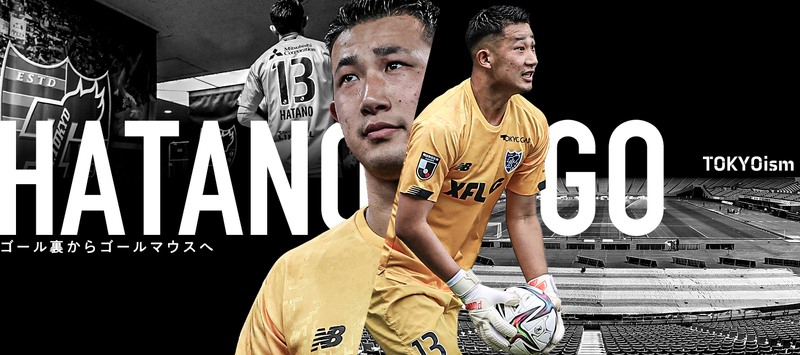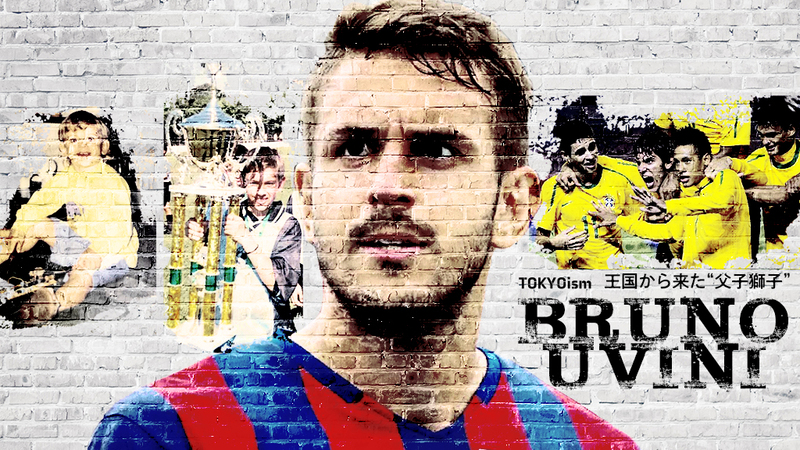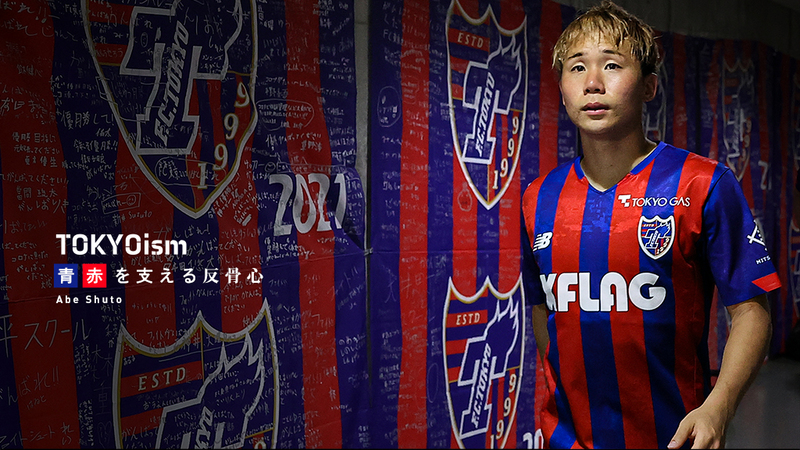It will be before the corona disaster.
The media was provided with the first floor of the Kodaigahara clubhouse as a dressing room, but this is a passageway connecting the entrance and the pitch to the second floor, and the FC Tokyo U-18 players also showed their faces there every day. By the time the reporters finished their work covering the top team, high school students participating in the evening practice would arrive.
It was already 7 years ago when high school freshman Go HATANO suddenly opened the sliding door from the court side and showed his face. I vaguely remember him answering "I'm still growing" about his blessed physique. He also mentioned the "joke" that he looks like Sota HIRAYAMA. He was recognized as an exceptional presence. He left a vivid impression.
The surrounding belief that this child will definitely become a professional is not betrayed, as they are promoted to the top team and inherit Mr. Hirayama's number 13 position. They have now become a presence that protects Tokyo's goal as the main goalkeeper.
Smooth sailing at first glance.
However, the beginning of his goalkeeper career was surprisingly late, when he was in 4th grade of elementary school.
Transition from FW to GK at the age of 4
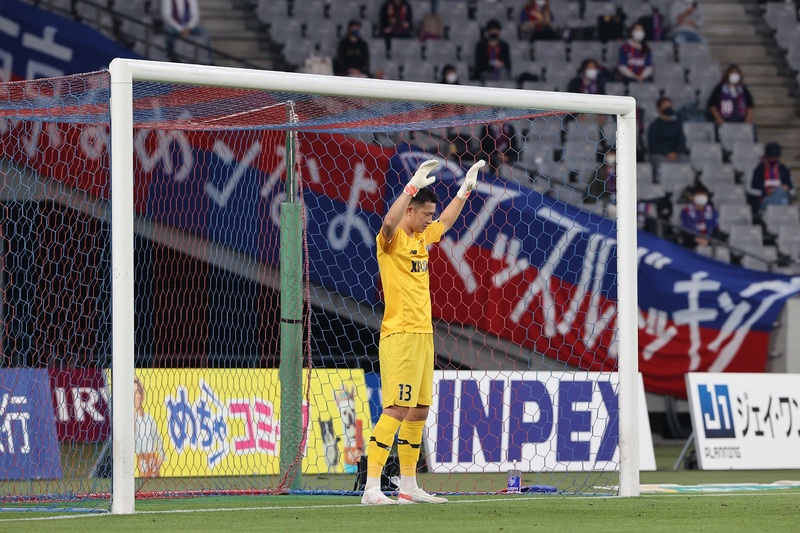
Keisuke Akiyama, who was in charge of coaching at FC Tokyo Soccer School and the Advanced Class, explained the background of "conversion".
"Around the time when goalkeepers were also being called upon for their footwork skills. However, he was somewhat unsteady as a specialist from the beginning. In that regard, he fulfills the elements of a field player as a forward for his hometown club (Musashimurayama 1FC). So intentionally, he was given gloves and gradually guided to become a goalkeeper while also playing as a forward without feeling out of place."
Height was about 180cm at the time of elementary school. It must have been genetic, and it was excellent as a material. Other club coaches also said, "Don't you play as a goalkeeper?"
"Bright and energetic in a good way. He was an energetic child." (Coach Akiyama)
Although he is a member of the top team, he is known for his mischievous and lively personality, which seems to be a testament to the fact that he has not lost his innocence from his elementary school days.
Coach Jun Akiyama saw it as an expression of human strength and took it positively.
"Some coaches may find it difficult. They may lack composure and be difficult to coach. But Makoto had enough energy to be praised for his character, and he would immediately calm down when angry. We saw him as a child, just like any other child."
Makoto OKAZAKI, who played with Go HATANO during his time at FC Tokyo U-18, is referred to as "Mako". His position is center back. While he was vocal in giving instructions, he was not particularly good at raising the team's spirits. That's where Go stepped in and expressed his gratitude.
OKAZAKI looks back on his high school days.
"Gou had a sense of stability. It was helpful to have someone who could shout loudly and liven up the atmosphere. His personality played a big role in making the U-18 team a good team. That's where the trust comes from. I think it's a strength."
Akihiro HAYASHI, who is approaching his return, is also highly praised in that regard.
"In my ideal image, a goalkeeper must have the power of speech. I believe that one of the goalkeeper's missions is to be able to positively encourage the team with their own voice. Communication is one of the important elements for a goalkeeper."
In modern times where there are many quiet children, personalities like Go HATANO are becoming rare. Although his character stands out in Japanese standards, Coach Akiyama from Brazil acknowledges it positively, saying "I have a very wide strike zone for children, so I want to do something about any child."
"There are various ways for children to express their energy. It is our job to understand that and watch them grow into adults. Gou was definitely one of them. A serious coach may find it difficult to discipline, but there are stages of growth. Recently, when I talked to him after a long time, I realized once again that players will always grow up."
If you can control the excess energy accurately, it is not impossible to lead to a big player. The warm gaze of those around him has nurtured him into a spectacular goalkeeper.
Go HATANO looks back on his elementary school days, which marked the beginning of his life as a goalkeeper.
"My mother gave me a lot of support. She always told me, 'You never know who is watching.' Whether it was at FC Tokyo's school or at a local club game, I was always told to play as if it were a selection. Coach Akiyama always told me to 'give it your all' before practice or a game. I believed in those words and worked hard during my elementary school years."
In practice games, if there is an adult coach on the opposing team, we will lose. We were determined not to lose to them and that's how we improved. As our desire to become better than these coaches grew stronger, we would sometimes say hurtful things and get scolded by our mothers on the way home.
"I tend to have a bad mouth. My mother scolded me a lot in the car on the way home. Her presence has been a big influence on me. I have grown up to be strong."
A brave mother, a mischievous Australian boy, and kind coaches watching over them. This circle of grassroots development is preparing for the tough competition of the development age to come.
J1 debut in 4th year as a professional
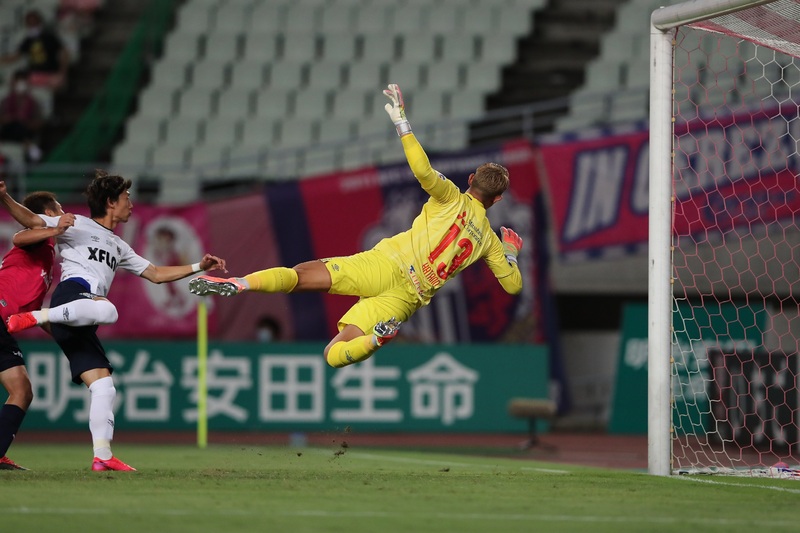
As he became a junior high school student, Hatano joined FC Tokyo U-15 Musashi and under the guidance of U-15 Musashi GK coach Kazuyoshi Karashima, he continued to develop his foundation as a goalkeeper.
In elementary school, although his body was big, he couldn't move smoothly yet. He had a habit of catching the ball with his feet instead of his hands, and his skills were lacking. He made up for these weaknesses during his three years in junior high school. During his time, Riku HIROSUE and Louis YAMAGUCHI were in FC Tokyo U-15 Fukagawa, but YAMAGUCHI and Go HATANO were promoted to U-18. YAMAGUCHI also transferred to Lorient in France while he was in U-18, so he maintained a competitive spirit with players like Haruhiko TAKIMOTO (currently Kashiwa Reysol) who he would meet in youth national teams, with the goal of becoming better than them.
By participating in the top team's practice, I experienced the level of the J-League. I measured the distance to my goal.
For Hatano, the natural grass court on the other side of the aisle was a challenge.
"When I was a second year high school student, I had more opportunities to participate in training with the top team, and that's when I realized the reality. I couldn't keep up at all. At that time, I would participate in the top team's morning training, and if it was a second team training, I would also play with the top team in the afternoon, and then have youth team training at night, so it was tough, but it was a great three years for me that became a big plus."
What sets professional players like Shuichi GONDA, Tatsuya ENOMOTO, Kentaro KAKOI, and Yota AKIMOTO apart?
"Not just technically, but I couldn't keep up. It's not about speed, but the power of each individual, and I felt that there was a big difference in terms of muscle strength. I had the feeling that I could stop the shot, but... it's not just about the lower body, but also the core and arm muscles, and having power makes a difference in that one step of explosive power. I was just falling down. That's where I felt I was lacking."
After being promoted to the top team, Go HATANO continued to steadily improve himself to become a professional player, while rejoicing at the sight of his younger classmates achieving the Premier League EAST title and Championship victory that he could not. The 2019 season was the stage to put his efforts to the test, as he wore the number 13 on his back. That year, Go HATANO played in a personal best of 23 games in the J3 League, gaining valuable experience.
"I gained some confidence there and I think my game sense was also nurtured. J3 is at a different level than J1. Still, being able to wear the captain's armband and play in a leadership position for the team was a valuable experience."
In the 2020 season, which marked the 13th year of his goalkeeper career since 2008, everything was ready. After losing to Sagan Tosu in the J1 Sec. 8 match, HATANO made his J1 debut in the Sec. 9 match against Cerezo Osaka at YANMAR STADIUM NAGAI. His opponent was his senior from Musashi, Tatsuhito Sakamoto, who was two years ahead of him.
"I was extremely nervous during the practice the day before, but when I arrived in Osaka, I was in my usual state and had confidence, so I just had to produce results. (On the day of the game) I wasn't nervous. The first play was a cross from the right, and (Sei) Muroya cleared it, which gave me even more motivation. I thought to myself that I had to help out next time. That one play raised my spirits and I have a memory of being able to play as usual."
However, the first adventure ended with 3 goals conceded (3-3 draw) in the 11th round match against Sanfrecce Hiroshima. In this match, there were some noticeable mistakes, and Hatano focused on training to improve his catching and kicking accuracy. He also approached the game during practice with the determination to beat the opposing goalkeeper and worked on improving his technical skills. He even planned to stop all shooting practice. This effort paid off, and he regained his position in the 30th round match against Kashiwa Reysol. After that, there was an accident where Akihiro Hayashi was injured just before the departure for the ACL, but Hatano contributed to the team's advancement to the group stage with a strong determination of "I have to defend" (Hatano) during the Qatar expedition. By experiencing tough matches against strong individuals such as Renato AUGUSTO, he grew significantly.
And now, we have reached this year, the 2021 season. The team struggled as they continued with the 4-3-3 formation from the end of last season.
However, Hatano grew through self-reflection and aligned himself with the team's recovery. Manager Kenta HASEGAWA told the players, "Don't forget what you went through during the difficult 5-game losing streak." Hatano also struggled through repeated defeats and used that experience to strengthen his defense in the future.
"We saw some goals conceded in the beginning, but all the responsibility lies with the goalkeeper. I have been thinking about how I can defend that area. Even if the defense is good, if the goalkeeper is not good when a shot is taken, we will concede. So first, I focused on how I can prevent shots."
Although he may be misunderstood as a cheerful and carefree character, he actually has a very serious personality. He analyzes the game and tries to find solutions by tracing back from the goals conceded. Even in situations where it seems impossible for the goalkeeper to make a save, the question of whether something could have been done becomes the starting point for his contemplation.
"We review every game and try to improve on what we couldn't do in practice. We are also working on how to prevent goals while communicating with the coach. (There were also 5 consecutive games without conceding) We conceded 3 goals in the J1 Sec. 21 match against C Osaka, so we still have to continue improving. No one is perfect, so even if it's a difficult shot, it's my job as a goalkeeper to stop it when it comes to my goal. When we concede a goal, there is always a reason for it. After the game, we think about it and discover what we couldn't do. On the other hand, when we make a save, we can see what we are doing well. We always review these things."
Lin also recognized this growth.
"Throughout the year, it is important for the team to have a solid foundation in the goalkeeper position. Currently, there are still unknowns as to how much progress has been made, but I feel that he is gradually understanding and finding his role in that area."
Okazaki, who is struggling to secure a defensive position in the same generation, sends this cheer to Go HATANO.
"I think the biggest change was last summer. I have confidence now that I can play in the game, and I think I'm growing in a really good direction. But it's still to come. When Hayashi comes back, how he behaves and how much he has grown during this period will be tested. I think Gou also understands that."
When he overcomes this competition, Go Hatano will surely reach the height he has been aiming for.
The power of intention to attract goal achievement
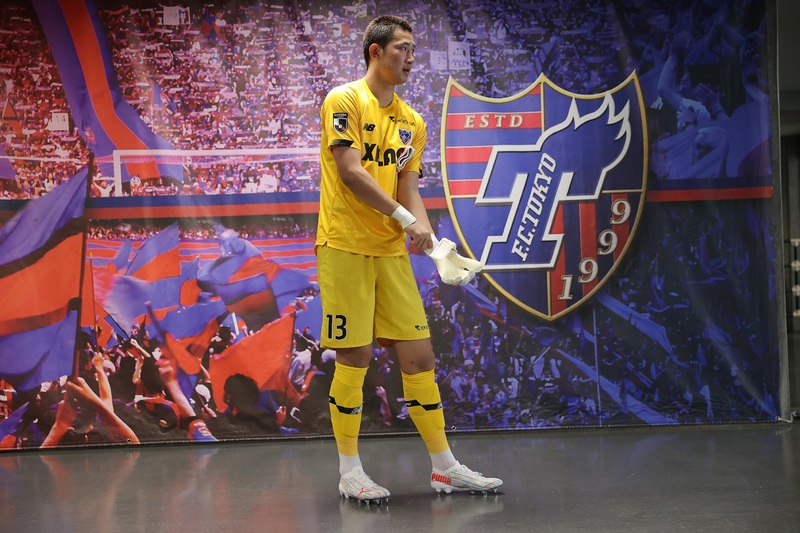
What becomes apparent when depicting his life is the ability to self-realize, similar to that of Yuto NAGATOMO. Setting goals and continuously moving towards them. It's not an easy task.
As a child, Go HATANO had both confidence and worries. In the end, his belief in himself prevailed.
"To be honest, I wasn't very good within that circle. I found the position of goalkeeper and was allowed to play, and it was fun. That's how it felt at first. When I was in the fourth grade, I took the selection for YOKOGAWA MUSASHINO FC as a goalkeeper, but during the mini-games, I played on the field. Then I was asked if I could come and play on the field instead of as a goalkeeper. However, since I had applied as a goalkeeper, I wanted to play as one. Just around the time I was about to enter the fifth grade, I was worried about whether I was suited to be a goalkeeper or not, and I thought maybe I wasn't cut out for it. But during that time, I was enjoying playing as a goalkeeper in the Advanced Class matches. What encouraged me to continue as a goalkeeper, despite my doubts, was watching goalkeeper plays at a match in Tokyo and wanting to improve as a goalkeeper, as well as gaining confidence from attending various goalkeeper schools. In the end, it was a strong feeling of determination that I would definitely make it. When it came to the U-15 Musashino selection, I was thinking of competing as a goalkeeper."
Coach Jun Akiyama is also amazed by Hatano's mentality.
"I have a strong desire to become a professional. It's quite rare. If there were more kids like that, it would create an atmosphere that would be greatly appreciated. In a good way, he's misunderstood. I think that's one of his unchanging good qualities. Even if people think, 'Are you okay?' when he says he wants to be the best in the world, he still sticks to it. That's truly his characteristic."
First of all, set your goal to be the best in the world, like Maradona, and strive to get closer to that goal. As a result, even when I was a beginner goalkeeper in 4th grade, I was able to secure a regular position in Tokyo's top team and show my desire to play for the Japan national team.
When I was in elementary school, I played at Ajinomoto Stadium and it was my dream to play in front of a full house. He always had a strong desire to become a professional and to succeed in Tokyo. And now that dream is coming true, he still has high goals to strive for.
"Not being selected for the Japan national team means that there is something I am not doing well. As a goalkeeper, there is something lacking. In order to receive better evaluations, I need to become more skilled and have a strong desire to improve. I still want to continue playing for another 20 or 30 years, so I want to train with a strong desire for improvement and a strong mindset in order to perform even better."
One reason I was able to come this far may be because of my love for blue and red.
For one year as a sixth grader and three years as a junior high school student, Go HATANO watched Tokyo's matches from behind the goal. Now, as he guards the goal that lies in the extension of his line of sight, he continues to fight with the support of the fans behind the goal where he once stood. HATANO spoke about his joy and sense of duty.
"Standing in front of the goal mouth means that we are also protecting the Tokyo fans and supporters. Behind the goalkeeper are also the fans and supporters. When the ball enters our own goal, it's a really unpleasant feeling, like "Oh, we let it in." So I want to protect the feelings of the fans and supporters and also defend the Tokyo goal. I want everyone to be able to support our game with a smile and have fun, so not only the goal, but also the smiles of everyone and the feelings of those who come to watch the game, I feel like I want to protect them."
The reason Okazaki praised Hatano's feelings rather than his technique can now be understood. The performance on the pitch itself will also change depending on whether or not there are feelings, and how people perceive what is expressed on the pitch will also change.
Hatano fights for the team even when he is not playing, shouting from the sidelines. Fans and supporters are moved by his dedication.
That's where Go HATANO's good point and strength lies, no doubt.
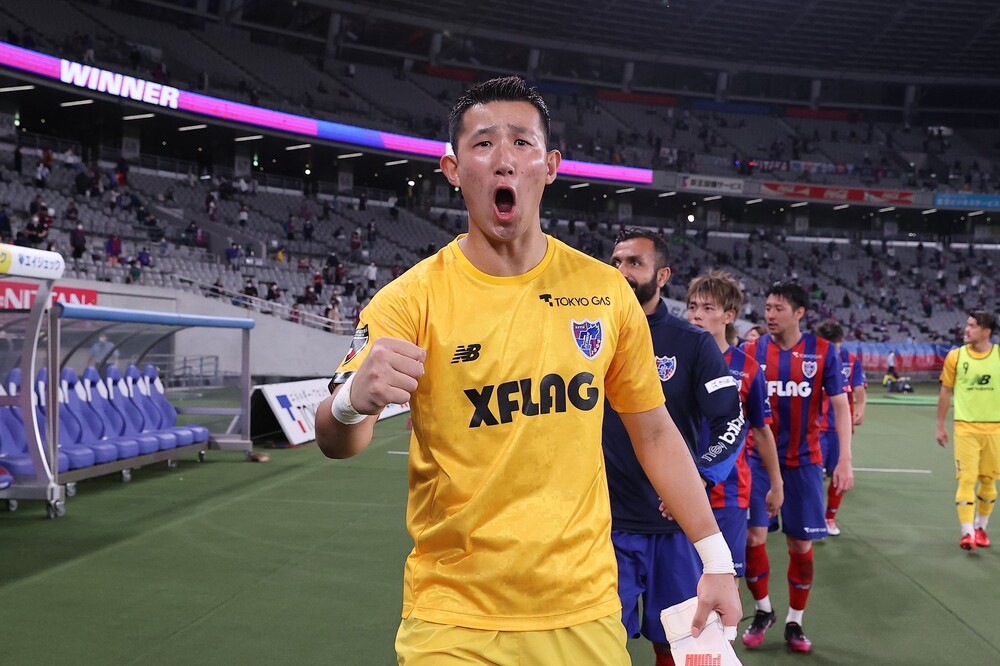
Height/Weight: 198cm/98kg
Hometown: Musashimurayama, Tokyo
Career: FC Tokyo U-15 Musashi → FC Tokyo U-18 → FC Tokyo
Text = Goto Masaru
Text by Goto Masaru
Photo = Kenichi Arai
Photo by Kenichi Arai
